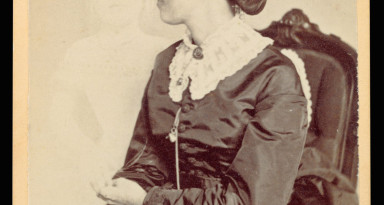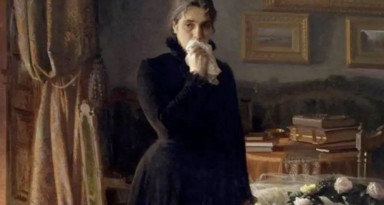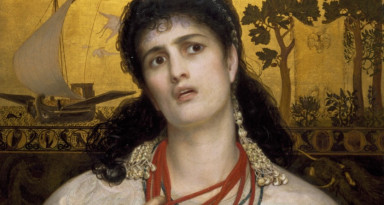While on holiday in Vienna in 1833, the English poet Arthur Henry Hallam died suddenly of a cerebral haemorrhage, aged just twenty-two. Over the next seventeen years, one of his close friends and fellow poets worked on an elegy in his honour. “In Memoriam A.H.H.” was published anonymously in 1850; later that same year, its author, Alfred Tennyson, was appointed Poet Laureate.
Tennyson’s poem is a remarkable work of mourning, one that perhaps predictably struck a chord with the most famous mourner of the era, Queen Victoria herself. The poem’s most enduring legacy however is one specific phrase from Canto XXVIII, which has become familiar to the point of cliché. Here it is, in its original context:
I hold it true, whate’er befall;
I feel it when I sorrow most;
‘Tis better to have loved and lost
Than never to have loved at all.
Seventeen years is a long time to process grief, but this is the sort of wisdom that takes a while to arrive at: loss knocks the wind out of us, and we need to get our breath back before the reflection can start. Once it does, Tennyson’s claim starts to seem reasonable. The intensity of pain is an index of the enormity of what we’ve lost; it stands to reason, then, that provided grief doesn’t actually outweigh love, our life would have been drastically worse off had we never loved at all. Presumably that doesn’t just apply to death either, but to all the things we lose throughout the course of our lives.
Tennyson’s consolation, however, assumes that we can compare having love and then losing it with never loving in the first place. It asks us to compare two possible worlds and determine which is more valuable. To put things in hideously reductive terms, if loving someone adds 10,000 units of good to your life, and losing them adds 3,000 units of bad, then a life in which you love and lose is still (all else being equal, which of course it never is) 7,000 units of good better off than a life in which you never love them at all. Your life contains more good things, even if those good things are now in the past.
But once we start comparing things we’ve lost with things we never gained, a funny thing happens. Imagine a famous singer, whose incredible talent brings profound joy to themselves and others – until disease or injury suddenly costs them their singing voice at the height of their powers. This is, unarguably, a tragedy. Still, we might try to console the singer with the thought that at least they did have that gift, did enjoy their time in the limelight, and so on. If losing the talent is a deprivation, then it seems that never having had that talent in the first place would have been an even greater loss – precisely Tennyson’s point.
But if that’s true, then what about those of us stuck with our decidedly sub-par singing voices our whole lives? Aren’t we, just by lacking that same talent the singer has lost, suffering a terrible deprivation too? Yet if we are, few of us seem to be bothered by this fact, or countless others like it. We don’t walk around commiserating with each other for not having outstanding gymnastic ability or not being born into royalty. There are no ‘Sorry you’ve never won the lottery’ or ‘Sorry you’ve never met the right person’ greeting cards. Intuitively, I’m not harmed by never having had something in the same way I’m clearly harmed by losing it. There’s an implicit asymmetry here: losing things is worse, somehow, than never being benefitted in the first place.
Perhaps this is just as well. If there wasn’t such an asymmetry between losing and never-having, then it seems there would be no end to the catastrophes that have already befallen each and every one of us. Your life would already be blighted by your tragic inability to fly, read people’s minds, or be the world’s greatest juggler. Are you really harmed by such things? It’s true that medieval theologians acknowledged a whole category of metaphysical evils, the inherent imperfections that blight human life such as mortality and finitude. But it seems silly to suggest you’re harmed by not being omniscient or omnipotent.
Tennyson might agree that you can’t miss what you never had, and so you can’t mourn for a love you never knew. You might regret never loving at all, given most people get to experience love at least once. But we’re talking about the loss of particular persons, not love per se. Who would trade having had the chance to love this person just to save themselves the pain of losing them? Tennyson asks us to compare a world in which a specific love is lost with a world in which it never begins in the first place. Surely, Alfred might say, we can see that the former world contains more good than the latter?
But strange things happen to moral mathematics when you start to compare things that exist and things that don’t, and the asymmetry between good and bad things, and so between harming and benefitting, can lead us down some very dark alleyways.
The South African philosopher David Benatar has argued that all lives, even the best of them, contain a significant amount of pain. It’s not just that we love and lose; we also stub our toes, embarrass ourselves, contract diseases, and so on.
Hopefully, most people’s lives are a net benefit – that is, their lives contain more good things than bad, and are worth living. But the bad bits are, for all that, still bad.
If all lives involve suffering, then it seems that you harm someone, to some extent at least, just by bringing them into existence. To bring a child into the world is to guarantee them at least some quantum of misery and pain. Doing so also makes it possible for that child to experience joy, pleasure, and satisfaction, too. Recall, however, the asymmetry we discussed above: it’s bad to be harmed, by losing things for instance, but it’s not necessarily a harm not to be benefitted. In Benatar’s version, the asymmetry tells us that the absence of pain is a good thing, even if there’s nobody there to feel pain, whereas pleasure is only valuable if there’s someone there to experience it.
Putting all this together yields the chilling conclusion that we harm someone by bringing them into existence and thereby exposing them to suffering, but we don’t harm them by not bringing them into existence and so depriving them of the joys of life. We’re morally obliged not to create unhappy people, but we’re not obliged to create happy ones. It’s a reasonably complex argument, but the end result is stark: it would be better, morally speaking, if nobody was ever born.
This position, known as antinatalism, is far from popular (though a few environmentalists endorse it for other, less philosophically arcane reasons). It’s one of those arguments that people deeply want to believe is wrong. There are moments in his book Better Never To Have Been when Benatar himself expresses a certain regret that this is where his argument leads us. For many lay commentators, if philosophers are saying things like this, then the problem is not with having children, but with philosophy itself.
I maintain that philosophy can indeed teach us much about the nature of loss. At its best, philosophy can even console, even if it sometimes speaks its words of comfort in a stilted and awkward way. But there are other times when those who know the pain of loss would be justified in rebuking the philosopher in Tennyson’s own words:
Behold, ye speak an idle thing:
Ye never knew the sacred dust:
I do but sing because I must,
And pipe but as the linnets sing
From the Loss edition of New Philosopher, which you can purchase from our online store. Subscriptions to the world's leading philosophy magazine can be purchased here.








